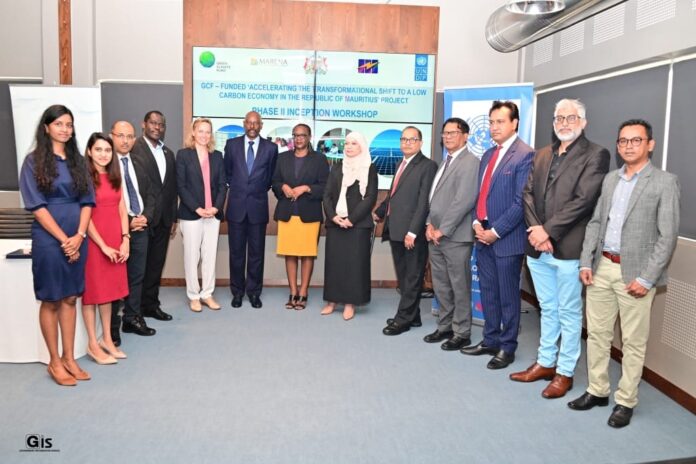
Mauritius: An inception workshop for the implementation of the second phase of the Green Climate Fund (GCF) project focusing on accelerating the transformation shift to a low-carbon economy in the Republic of Mauritius opened this morning at Le Voila Hotel, Bagatelle.
The Minister of Energy and Public Utilities, Mr Georges Pierre Lesjongard, the United Nations Development Programme (UNDP) Resident Representative, Ms Amanda K Serumaga, representatives of the Central Electricity Board and Mauritius Renewable Energy Agency as well as personalities were present at the opening ceremony.
Delivering his keynote address, Minister Lesjongard reiterated the Government’s commitment to produce 60% of the country’s energy needs from renewable sources and to phase out the use of coal by 2030 with a view to shift to a low carbon economy and to combat the climate change effects. Against the backdrop of global challenges, such as the ongoing war between Russia and Ukraine, he pointed out that the world is witnessing an unparalleled energy crisis with significant adverse impacts, which calls for investment in renewable energy.
He, therefore, emphasised that it is in this context that the Ministry has sought the assistance of the GCF to accelerate the transformational shift to a low carbon economy with a substantial reduction in grid-related GHG emissions while highlighting that the project was approved by the GCF Board in December 2016 for a total sum of USD 28 million.
Elaborating on Phase I of the GCF project, launched in 2017 and completed in December 2021 at the cost of USD 11 million, the Minister highlighted that it has been instrumental in the achievement of several policy objectives, such as the provision of financial and technical support to the CEB for the purchase and installation of 18 MW battery energy storage system in order to upgrade and strengthen the national power grid for the safe and sustainable integration of intermittent renewable energy such as solar and wind.
Speaking on the implementation of phase II of the project, under the GCF grant, which will kickstart as from January 2023, Minister Lesjongard pointed out that it is of a duration of five years and will include the deployment of 25 MW of rooftop small and medium scale solar photovoltaic systems across three main categories namely low and middle-income households, non-governmental organisation and public buildings, he added.
The Public Utilities Minister further observed that an automatic distribution management system would also be financed under the project to help the CEB manage more efficiently the distribution and routing of electricity across the national grid.
The project, he said, will also include the electrification of three villages in Agalega with solar PV, which are as follows: Saint Rita, La Fourche and Vingt Cinq.
Mr Lesjongard also dwelt on the current incentives and schemes offered by the CEB. Under the Home Solar Project Phase II, 1 435 applications were received for the installation of 1.5 KW kits; 1 190 household owners have already signed their connection agreements while 221 installations have already been commissioned, he stated. For electric vehicle owners, the Minister noted that 56 applications had been received by the CEB, and 29 electric vehicle owners had already signed their connection agreements.
Also, speaking at the opening of the workshop, the UNDP Representative extended satisfaction as regards the progress achieved in the local renewable energy sector for the completion of Phase I of the project and the transition to Phase II. She spoke of the UNDP’s continuous support to partnering with Mauritius over four decades to mitigate climate change and achieve the Sustainable Development Goals.
Ms Serumaga further mentioned that the UNDP has been collaborating with Mauritius to implement several programmes aiming to reduce greenhouse gas emissions and increase renewable energy in the country’s electricity mix. The UNDP has also assisted Mauritius in accessing global financing for climate change mitigation and adaptation, she added.